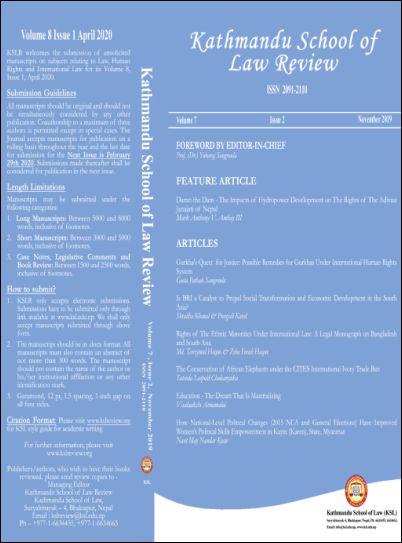How National-Level Political Changes (2015 NCA and General Elections) Have Improved Women’s Political Skill Empowerment in Kayin (Karen) State, Myanmar
Abstract
Ethnic women from Myanmar have for several decades experienced acute human rights violations related to conflict, such as violence and harassment, with limited opportunity to speak out. The objective of this paper is to explore about women’s experiences in political skills empowerment and to assess the impact of training led by women’s rights-based organizations in Kayin State, Myanmar. The research uses in-depth interview methodology through interviewing 14 key-informants. Interview findings show that many interviewees felt that women’s participation in voting, local-level politics and peace processes have improved since the 2015 NCA and the general elections, highlighting the impact of the promotion of peace and democracy for politically marginalized groups. The research also found that as a result of the training, women participants have become better at engaging with different key actors and better equipped in the decision-making process in communities. The trained women became more involved in legal assistance for human rights violations; often, however, this involvement focuses solely on issues that are specifically related to women. Nevertheless, women still suffer from less confidence and reduced capacity to participate, gender discrimination, weak governmental initiatives, financial restraints, and fewer opportunities to access leadership in local-level politics. The research also found that the key barriers for women are communicative, both in terms of education and access to language, lack of capacity, and limited access to information, as well as socio-cultural norms that prioritize men’s leadership and decision-making, and limited, poorly resourced governmental initiatives for women’s political skill-building. The research recommends on-going coaching, mentoring for women, and initiating advocacy against gender discrimination in all spheres, mainly at the local and national political level to increase women’s participation in political processes. The government also should formulate law and policy to provide women’s political skills empowerment in line with CEDAW and the Beijing Declaration and Platform for Action.
Downloads
Downloads
Published
How to Cite
Issue
Section
License
Copyright (c) 2019 Kathmandu School of Law

This work is licensed under a Creative Commons Attribution 4.0 International License.
© Kathmandu School of Law

